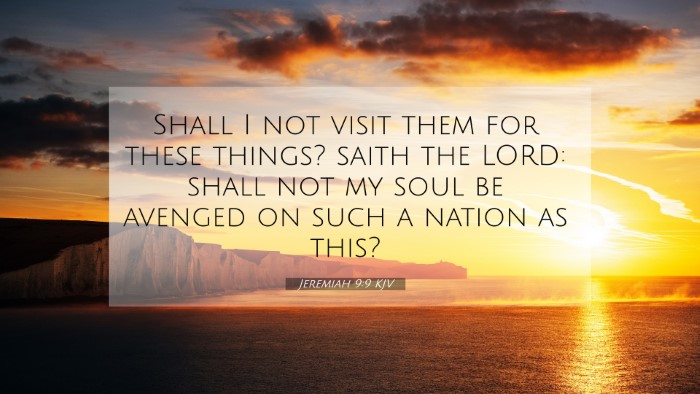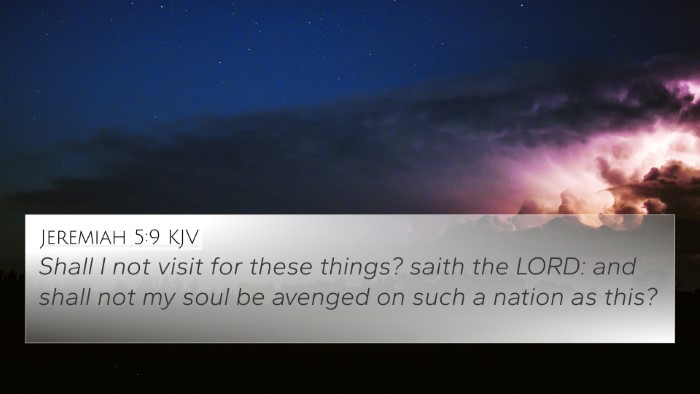Understanding Jeremiah 9:9
Jeremiah 9:9 states, "Shall I not visit them for these things? saith the Lord: shall not my soul be avenged on such a nation as this?" This verse falls within the context of the prophet Jeremiah's lamentation over the grave sins and idolatry of Israel. It encapsulates a divine warning and a clarion call to recognize the gravity of the situation.
Combined Insights from Public Domain Commentaries
Matthew Henry's Commentary
Matthew Henry emphasizes that this passage highlights God's intention to bring judgment upon His people due to their transgressions. The phrase "Shall I not visit them?" suggests a divine obligation to rectify the moral decay prevalent among the people. Henry notes that God’s soul is offended by the rampant idolatry and injustice, indicating the depth of divine emotion tied to the covenant relationship.
Albert Barnes' Commentary
Albert Barnes provides a somber reflection, asserting that God's judgment is inevitable when His people turn away from His statutes. Barnes underscores that the rhetorical questions posed by God demonstrate the certainty of divine retribution. The "vengeance" mentioned is not arbitrary but stems from justice and a desire for repentance among the nations. It’s a call to realize the consequences of forsaking God's ways.
Adam Clarke's Commentary
Adam Clarke elaborates on the emotive depth of Jeremiah 9:9. He points out that God is portrayed almost as a grieving father, deeply affected by His children's disobedience. Clarke’s analysis notes that the passage invites believers to engage in deep reflection about their own practices and faithfulness. Here, the call for God to "visit" indicates a desire for active engagement from God in the face of wrongdoing.
Thematic Connections and Cross-References
This verse connects with various themes throughout the Bible, particularly concerning judgment, divine justice, and the call for repentance. Below are key cross-references that enhance understanding:
- Hosea 4:1-2 - Addresses Israel's transgressions and God's lamentation over their unfaithfulness.
- Ezekiel 18:30 - Calls for repentance, showing that God desires a change in heart.
- Romans 1:18-20 - Discusses the wrath of God against sinful humanity, reinforcing the necessity of accountability.
- Isaiah 1:16-17 - Encourages cleansing and doing good, resonating with the call for righteousness.
- Galatians 6:7 - Emphasizes that God is not mocked; what one sows, one will also reap.
- 2 Chronicles 7:14 - Calls the people to humility and prayer for divine healing and restoration.
- Hebrews 10:31 - Warns about the fearful consequences of falling into the hands of a living God after knowing the truth.
Application and Interpretation of Jeremiah 9:9
The crux of Jeremiah 9:9 lies in its dual message of warning and hope. While it captures the essence of God's judgment, it also urges individuals to reflect on their lives and turn back to righteous living. The thematic connections across the Scripture illuminate God's continuous desire for His people to seek Him amid their failings.
Cross-Referencing Biblical Texts
Cross-referencing Biblical texts can effectively enhance one’s understanding of Scripture. Tools for Bible cross-referencing such as concordances and cross-reference Bible study guides can be invaluable resources. This verse serves as an excellent example of how to identify connections between Old and New Testament.
Conclusion
In conclusion, Jeremiah 9:9 stands as a powerful reminder of God's holiness and justice. By examining this verse alongside others, believers can cultivate a deeper insight into God's character and the overarching narrative of redemption throughout the Bible. Understanding the inter-Biblical dialogue fosters a richer appreciation of scriptural truths and encourages a life aligned with God's will.





